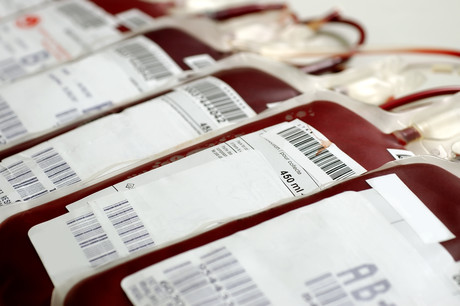Blood type differences determined with sequencing software

US researchers have developed a computer program that utilises whole genome sequencing to type hundreds of important blood type differences, enabling more precise matching for future blood transfusions. Their results have been reported in The Lancet Haematology.
Most people are familiar with A, B, AB and O blood types, but there are hundreds of additional blood group ‘antigens’ on red blood cells — substances that can trigger the body’s immune response — that differ from person to person. We are all born with antibodies unique to our ABO blood type, but other antibodies against specific blood antigens can be stimulated during pregnancy from exposure to foetal cells or exposure to donor cells when receiving multiple blood transfusions.
Problems are most likely to arise during blood transfusions, which are one of the most common procedures in medicine yet can also result in potentially life-threatening complications. When the body encounters foreign antigens on donor cells, it can stimulate production of antibodies that can destroy the transfused donor cells. Each year, up to 16 deaths reported to the Federal Drug Administration are attributed to mismatches in red blood cell antigens.
Currently, no method is available that can determine all blood antigens — but as whole genome sequencing becomes routine for patients, it may be possible to identify both rare donors and at-risk recipients before blood transfusions. Now, investigators from Brigham and Women’s Hospital (BWH), Harvard Medical School and the New York Blood Center have leveraged the MedSeq Project, claimed to be the first randomised trial of whole genome sequencing in healthy adults. The goal of the project? To develop and validate a computer program that can comprehensively determine differences in individuals’ blood types with more than 99% accuracy.
“With current technology it is not cost-effective to do blood typing for all antigens,” said Dr William Lane from BWH. “But the algorithm we have developed can be applied to type everyone for all relevant blood groups at a low cost once sequencing is obtained.”
Today, most testing for blood donors and patients includes only ABO and Rh matching, but more than 300 red blood cell antigens and 33 platelet antigens are known. To create a way to cost-effectively type many people for these antigens, Dr4 Lane teamed up with scientists directing the MedSeq Project and experts in blood group genetics at the New York Blood Center to build a database and develop a computer software algorithm, known as bloodTyper, that could rapidly predict an individual’s blood group antigen profile from genomic sequences.
“This approach has the potential to be one of the first routine clinical uses of genomics for medical care for patients needing blood transfusion,” said Dr Connie M Westhoff from the New York Blood Center. “It could prevent serious or even fatal complications because once patients are sensitised they have a life-long risk of haemolytic transfusion reactions if blood transfusion is needed in an emergency.”
The colleagues validated the software by comparing it to traditional, more labour-intensive methods. bloodTyper was more than 99% accurate when typing from the MedSeq Project participants’ genomes.
“This report demonstrates a previously unanticipated use case and benefit that will accrue as whole genome sequencing becomes a routine part of medical care,” said MedSeq’s principal investigator, Professor Robert Green from BWH and Harvard Medical School. “Genome sequencing can now identify potential transfusion recipients who need rare blood types and the individuals who can safely provide them.”
Novel antibiotic activates 'suicide' mechanism in superbug
Researchers have discovered a new class of antibiotic that selectively targets Neisseria...
Modifications in the placenta linked to psychiatric disorders
Schizophrenia, bipolar disorder and major depression disorder are the neuropsychiatric disorders...
ADHD may be linked with an increased risk of dementia
An adult brain affected by attention deficit hyperactivity disorder (ADHD) presents modifications...




